- Python Basic Programs
- Python Program Examples
- Python Print Hello World
- Python Get Input from User
- Python Add Two Numbers
- Add Subtract Multiply Divide
- Python Check Even or Odd
- Python Check Prime or Not
- Python Check Alphabet or Not
- Python Check Vowel or Not
- Python Check Leap Year or Not
- Check Reverse equal Original
- Check Positive Negative Zero
- Python Check Armstrong or Not
- Python Check Palindrome or Not
- Python Check Perfect Number
- Python Find Reverse of Number
- Python Count Digits in Number
- Python Add Digits of Number
- Sum of First and Last Digits
- Python Product of Mid Digits
- Sum of Squares of Digits
- Interchange Digits of Number
- Python Sum of n Numbers
- Python Print ASCII Values
- Python Swap Two Numbers
- Python Swap Two Variables
- Python Fahrenheit to Celsius
- Python Celsius to Fahrenheit
- Python Display Calendar
- Python Days into Years, Weeks
- Find Largest of Two Number
- Find Largest of Three Number
- Python Print Fibonacci Series
- Generate Armstrong Numbers
- Python Make Simple Calculator
- Python Add Binary Numbers
- Binary Number Multiplication
- Python Mathematical Programs
- Find Sum of Natural Numbers
- Find Average of n Numbers
- Python Print Multiplication Table
- Print Table using Recursion
- Python Find Average Percentage
- Python Find Grade of Student
- Find Square Root of Number
- Python Print Prime Numbers
- Find Numbers Divisible by
- Python Find Factors of Number
- Python Find Factorial of a Number
- Python Find HCF & LCM
- Python Kilometres to Miles
- Python Find Area of Square
- Python Find Area of Rectangle
- Python Find Area of Triangle
- Python Find Area of Circle
- Python Find Perimeter of Square
- Find Perimeter of Rectangle
- Python Find Perimeter of Triangle
- Find Circumference of Circle
- Python Simple Interest
- Python Solve Quadratic Equation
- Python Different Set of Operations
- Python Display Powers of 2
- Python Find nCr & nPr
- Python Pattern Programs
- Python Print Pattern Programs
- Python Print Diamond Pattern
- Python Print Floyd's Triangle
- Python Print Pascal's Triangle
- Python List Programs
- Python Count Even/Odd in List
- Python Positive/Negative in List
- Python Even Numbers in List
- Python Odd Numbers in List
- Python Sum of Elements in List
- Sum of Odd/Even Numbers
- Python Element at Even Position
- Python Element at Odd Position
- Python Search Element in List
- Python Largest Number in List
- Python Smallest Number in List
- Python Second Largest in List
- Python Second Smallest in List
- Python Insert Element in List
- Python Delete Element from List
- Python Multiply Numbers in List
- Swap Two Elements in List
- Python 1D Array Program
- Python Linear Search
- Python Binary Search
- Python Insertion Sort
- Python Bubble Sort
- Python Selection Sort
- Remove Duplicates from List
- Python Reverse a List
- Python Merge Two List
- Python Copy a List
- Python Conversion Programs
- Python Decimal to Binary
- Python Decimal to Octal
- Python Decimal to Hexadecimal
- Python Binary to Decimal
- Python Binary to Octal
- Python Binary to Hexadecimal
- Python Octal to Decimal
- Python Octal to Binary
- Python Octal to Hexadecimal
- Python Hexadecimal to Decimal
- Python Hexadecimal to Binary
- Python Hexadecimal to Octal
- Python Matrix Programs
- Python Add Two Matrices
- Python Subtract Two Matrices
- Python Transpose Matrix
- Python Multiply Matrices
- Python String Programs
- Python Print String
- Python Find Length of String
- Python Compare Two Strings
- Python Copy String
- Python Concatenate String
- Python Reverse a String
- Python Swap Two Strings
- Python Uppercase to Lowercase
- Python Lowercase to Uppercase
- Python Check Substring in String
- Python Count Character in String
- Count Repeated Characters
- Python Count Word in Sentence
- Python Count Each Vowels
- Python Capitalize Character
- Python Capitalize Word in String
- Python Smallest/Largest Word
- Remove Spaces from String
- Remove Duplicate Character
- Remove Vowels from String
- Remove Punctuation from String
- Python Remove Word in String
- Python Remove Duplicate Words
- WhiteSpace to Hyphens
- Replace Vowels with Character
- Replace Character in String
- Python Sort String in Alphabetical
- Sort Word in Alphabetical Order
- Extract Number from String
- Python Check Anagram Strings
- Python File Programs
- Python Read a File
- Python Write to File
- Python Append Text to File
- Python Copy Files
- Python Merge Two Files
- Python Counts Characters in File
- Python Count Words in File
- Python File Content in Reverse
- Python Lines Contains String
- Python Delete Line from File
- Python Capitalize Word in File
- Python Replace Text in File
- Replace Specific Line in File
- Python Find Size of File
- Python List Files in Directory
- Python Delete Files
- Python Misc Programs
- Python Reverse a Tuple
- Python Merge Two Dictionary
- Python bytes to String
- Python bytearray to String
- Generate Random Numbers
- Python Print Address of Variable
- Python Print Date and Time
- Python Get IP Address
- Python Shutdown/Restart PC
- Python Tutorial
- Python Tutorial
Python program to find the sum of n numbers
In this article, you will learn and get code to find the sum of "n" numbers entered by the user using a Python program. Here is the list of programs:
- Using a "for loop," find the sum of "n" numbers.
- Using a "while loop," find the sum of "n" numbers.
- Find the sum of "n" numbers using "list."
- Find the sum of "n" numbers using a user-defined "function."
For example, if the user enters the value of "n" as 3 and then three numbers as 1, 2, and 3, then the answer will be "1+2+3" or 6.
Using a for loop, compute the sum of n numbers
This program finds the sum of "n" numbers using a "for loop." Here, the value of "n" and then "n" numbers must be entered by the user as shown in the program and its output given below:
sum = 0 print("Enter the Value of n: ") n = int(input()) print("Enter " + str(n) + " Numbers: ") for i in range(n): num = int(input()) sum = sum+num print("Sum of " + str(n) + " Numbers = " + str(sum))
Here is its sample run:
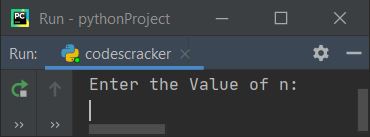
Now supply the input, say 6 as the value of n, and then enter 6 numbers, say 10, 20, 30, 40, 50, and 60. Here is the sample output with exactly these inputs:
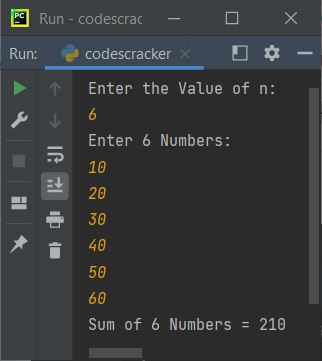
Note: "str()" is used to convert from integer to string. Because the "+" operator in Python is used to concatenate only values of the same type. The following code
for i in range(n):
is used to execute the following block of code:
num = int(input()) sum = sum+num
n number of times, starting with the value of i from 0 to n-1. For example, if the user enters the value of n as 10, then this block of code gets executed 10 times. Using this block, we've received 10 numbers, which add their values and are initialized to "sum," one by one.
Using a while loop, compute the sum of n numbers
This program does the same job as the previous program, using "while" loop instead of "for":
sum = 0 i=0 print(end="Enter the Value of n: ") n = int(input()) print(end="Enter " + str(n) + " Numbers: ") while i<n: num = int(input()) sum = sum+num i = i+1 print("\nSum of " + str(n) + " Numbers = " + str(sum))
Here is its sample run, with user input of 10 as the value of n and 1, 2, 3, 4, 5, 6, 7, 8, 9, and 10 as the 10 numbers:
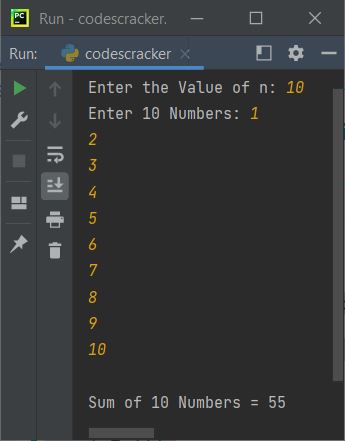
Sum of n numbers using a list (an array)
This program finds and prints the addition result (or sum) of "n" numbers entered by the user at run-time using "list." A list is like an array:
num = [] sum = 0 print(end="Enter the Value of n: ") n = int(input()) print(end="Enter " + str(n) + " Numbers: ") for i in range(n): num.insert(i, int(input())) for i in range(n): sum = sum+num[i] print("\nSum of " + str(n) + " Numbers = " + str(sum))
Here is its sample run with the user input, 5 as the value of n, and 5, 6, 7, 10, and 12 as five numbers:
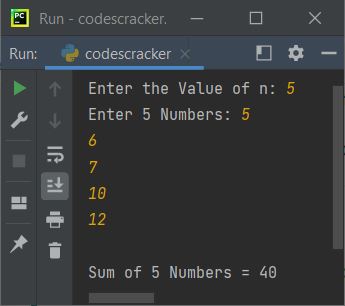
The following code
for i in range(n):
is used to execute the following statement:
num.insert(i, int(input()))
n times with i values ranging from 0 to n-1. Therefore, using "insert()," the value entered by the user gets inserted into the list num[] one by one in this way:
- The first value gets stored in num[i] or num[0].
- The second value gets stored in num[1].
- The third value gets stored in num[2].
- and so on.
Find the sum of n numbers using a function
This program is the last one in this article. This program also finds the sum of n numbers, as done in previous programs using different approaches. This program, like those, approaches the same task in a different way (a user-defined function):
def SumOfNNums(arr, tot): s = 0 for i in range(tot): s = s+arr[i] return s num = [] print(end="Enter the Value of n: ") n = int(input()) print(end="Enter " + str(n) + " Numbers: ") for i in range(n): num.insert(i, int(input())) sum = SumOfNNums(num, n) print("\nSum of " + str(n) + " Numbers = " + str(sum))
Here is its sample run with user input, "3" as value of "n" and "20, 30, 10" as 3 numbers:
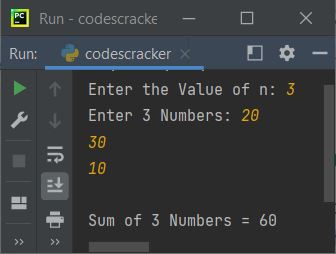
with the following statement:
sum = SumOfNNums(num, n)
We've called the function "SumOfNNums()." So after executing this statement, the function gets executed, and the value returned by the function is the result, which is the sum of "n" numbers entered by the user. So the return value gets initialized to "sum," and its value gets printed.
« Previous Program Next Program »